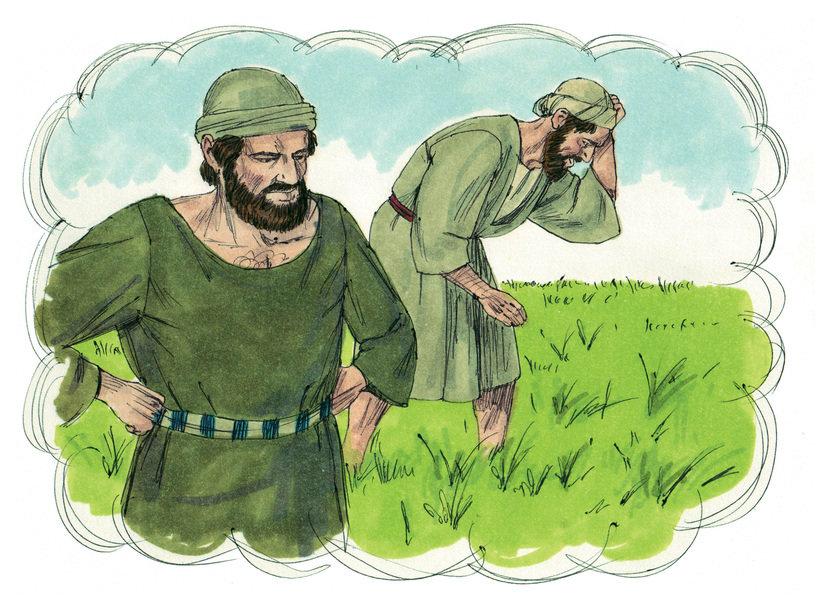Matthew 13:24-30 Matthew 13:36-43
The pictures in this parable would be clear and familiar to a Palestinian audience. Tares were one of the curses against which a farmer had to labor. They were a weed called bearded darnel (Lolium Temulentum). In their early stages the tares so closely resembled the wheat that it was impossible to distinguish the one from the other. When both had headed out it was easy to distinguish them; but by that time their roots were so intertwined that the tares could not be weeded out without tearing the wheat out with them.
The tares and the wheat are so like each other that the Jews called the tares bastard wheat. The wheat and tares could not be safely separated when both were growing, but in the end they had to be separated, because the grain of the bearded darnel is slightly poisonous. It causes dizziness and sickness and is narcotic in its effects, and even a small amount has a bitter and unpleasant taste. In the end it was usually separated by hand.
It may well be said that in its lessons this is one of the most practical parables Jesus ever told.
Jesus teaches us here:
- That hypocrites and deceived persons must be expected in the church.
- That this is the work of the enemy of man. They are not the work of Christianity any more than traitors are of patriotism, or counterfeiters are of the proper effect of legislating about money. They belong to the world, and hypocrisy is only one form of sin. The Christian religion never “made” a hypocrite, nor is there a hypocrite on the earth whose principles and practice it does not condemn.
- That all hope of removing them entirely would be vain.
- That an “attempt” to remove them altogether would injure real Christianity, by causing excitements, discord, and hard feelings even among Christians.
- That Christ will himself separate them at the proper time. There is no doubt that it is the duty of the church to keep itself pure, and to cut off gross and manifest offenders, 1 Corinthians 5:4-5; but the Savior refers here to those who may be “suspected” of hypocrisy, but against whom it cannot be proved; to those who so successfully imitate Christians as to make it difficult or impossible for man to distinguish them.
(i) It teaches us that there is always a hostile power in the world, seeking and waiting to destroy the good seed. Our experience is that both kinds of influence act upon our lives, the influence which helps the seed of the word to flourish and to grow, and the influence which seeks to destroy the good seed before it can produce fruit at all. The lesson is that we must be for ever on our guard.
(ii) It teaches us how hard it is to distinguish between those who are in the Kingdom and those who are not. A man may appear to be good and may in fact be bad; and a man may appear to be bad and may yet be good. We are much too quick to classify people and label them good or bad without knowing all the facts.
(iii) It teaches us not to be so quick with our judgments. If the reapers had had their way, they would have tried to tear out the darnel and they would have torn out the wheat as well. Judgment had to wait until the harvest came. A man in the end will be judged, not by any single act or stage in his life, but by his whole life. Judgment cannot come until the end. A man may make a great mistake, and then redeem himself and, by the grace of God, atone for it by making the rest of life a lovely thing. A man may live an honourable life and then in the end wreck it all by a sudden collapse into sin. No one who sees only part of a thing can judge the whole; and no one who knows only part of a man’s life can judge the whole man.
(iv) It teaches us that judgment does come in the end. Judgment is not hasty, but judgment comes. It may be that, humanly speaking, in this life the sinner seems to escape the consequences, but there is a life to come. It may be that, humanly speaking, goodness never seems to enter into its reward, but there is a new world to redress the balance of the old.
(v) It teaches us that the only person with the right to judge is God. It is God alone who can discern the good and the bad; it is God alone who sees all of a man and all of his life. It is God alone who can judge.
So, then, ultimately this parable is two things–it is a warning not to judge people at all, and it is a warning that in the end there comes the judgment of God.
William Barclay’s Daily Study BibleAlbert Barnes’ Notes on the Whole Bible
